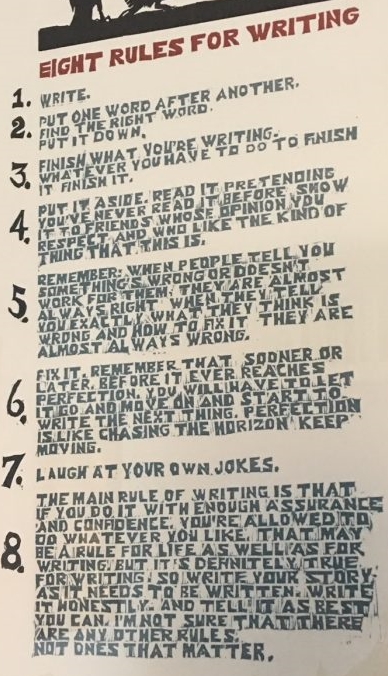5.22.18 How To Review Your Friend’s Book in 5 Easy Steps, and Why Authors Keep Asking You To
A friend writes: “Someone close to me has self-published her book and asked me to write a review. I helped her with edits years ago, but haven’t read it since she published. It wasn’t really my style, but I was happy to help. I have no idea what to write for a review. We’re trying to sell books. I don’t think my review will do it. Any ideas?”
I am so glad you asked this question. First of all, you’ve already done yeoman (yeowoman?) work in reading the thing in the first place, so you are already on the Good Friend List.
You also say you want to help her sell books, which makes you a Great Friend. As Tom McAllister recently noted in his essay at The Millions:
“Many people close to you will disappoint you. But there are people who will come through, and they will keep coming through, and sometimes you’ll be surprised who falls into which category. I’ve learned to cherish those friends and family members who are always there, or even sometimes there. It takes real sacrifice on their part to support this weird thing I do.”
The thing about taste is this: it’s subjective. A friend who doesn’t like your creative output isn’t necessarily less of a friend. Alas, creative output is often very tied into egos and identity, and so someone saying they don’t like something you’ve created can sound like “your offspring smells like the foot of a long-distance hiker.”
This often means friends say nothing, or do nothing, and trust me: that doesn’t work. We know if you don’t like it, or if it’s not your speed. We know this because you either never finish it, or never comment, or never ask about what we’re working on next.
So I would like to take you off the hook of loving, or even liking, your friend’s output. I have dear friends who make music, dance, and write – who I maybe haven’t ever seen or heard do those things. And if I have heard or seen them do those things, I might not find it to my liking. It is possible to appreciate a thing’s quality, but also know it isn’t your thing.
You support on the level you feel comfortable with. That support is so important, because when a friend shows you her creative output, she’s likely a bit raw and needy. Someone who helps in those moments is an ally as well as a friend.  None of this necessarily helps your situation.
None of this necessarily helps your situation.
So let’s try and assist. First off, bear in mind that:
a) Your review does not need to be War and Peace. It doesn’t even have to be about War and Peace. If you write three sentences, you will be golden. Hell, if you write two, you’re still golden. This is not the Olympics. There are no silver and bronze prizes. You have said something, publicly, about the book.
b) Your review does not need to be gushing or a lie. Lies feel like lies in a review. People can tell. You can be straightforward and state information, and still put up a review.
c) You can hold off on the review if the book is a complete train wreck with innumerable spelling/grammar/continuity/what have you errors, in which case you have to decide if you want to have a very different conversation with your friend. I am often angry at the friends of singing competition contestants who clearly didn’t sit down with their pal ahead of time to convince him or her that no, they really shouldn’t embarrass themselves like this. We need “no” friends in our lives as well as “yes” cheerleaders. (Your mileage may vary on this.)
d) Your review will do magic, though. Even if it is just two sentences. If you write a review somewhere like Goodreads or Amazon, it will help sell the book. Here’s a story from USA Today explaining why:
“Even a single comment can make a huge difference. Just going from zero review to one increases the rate at which online window-shoppers actually click the “buy” button by 65%, said Matt Moog, CEO of Power Reviews, a company that makes ratings and review software.”
The more reviews, the more likely someone will buy your friend’s book.
So, at long last, the answer to your unasked question: What should I say? Here are 5 things. Mix, match, tailor to your friend’s publication!
1) A quick summary of the book:
In a frozen wasteland, Frank is the one person who carries the fire. But as he searches for Estelle, his light may go out forever.
2) Pick something, however small, about the book you liked — a character, a scene, a theme, the prose itself, a location:
Frank’s dilemma really got to me, especially when he found that cache of matchsticks. I was so nervous he wouldn’t be able to light one!
I’m from Ohio and this book totally captured the landscape in winter!
3) Speak about the author:
Wilhemenia Albright knows how to hook a reader with suspense and terror!
4) Discuss the genre, suggest other authors or books or even movies that it reminded you of:
Frozen Ohio Tundra is a dystopic science-fiction novel that reminded me of The Road meets The Thing.
5) If all else fails, fudge a bit:
I’m not normally a fan of dystopic frozen wasteland books, but this one had me reading until the end! (Note: totally true, since you did read it at some point!)
Ultimately, a review does not have to be your greatest piece of writing. In fact, I personally prefer reviews that are less about feelings (which are subjective) than about facts: This is the final book in a three-book series, and completely tied up every loose end in a way I hadn’t expected.
The point is, you don’t have to like the book to write a positive review of it. But if you want to help your friend, writing a review will do so much.
Added in 2023: If you’re given the option to “rate” a book as well as review it, always give a 4 or a 5. I know, you’re a fair person and a “5” book should be something you’re ready to literally die for, but that’s not reality when it comes to the algorithm. Anything less than a 4 can sink the overall average for a book, and essentially translates to “this book was awful.” If you can only give a 3, 2 or 1 — maybe skip the review altogether, because you’re hurting more than you’re helping.
All of this said: If your friend has written a book that you just can’t get behind, tell her. Again, you don’t have to tell her it’s a gnarled old foot. At the least, it’s fair to say, “I thought it was well-done, but it’s just not my speed.” Refer her to 8 Rules of Writing, specifically Nos. 4 and 5:
If you have more time, see if you can find out how much, and what kind of feedback she wants and can handle. I went through many years of writing where I thought my first drafts were pristine wonders and how dare anybody question me. (Apologies to everyone I snapped at back then.)
I matured. A growing writer is ready to take thoughts and criticism and decide whether they matter to her story or not. A growing writer understands that not everyone – including her closest friends – will love her work. All we can hope for is that friends will support us when we turn off the creative side, and become business shills. We need our posse in those moments.
And we’re all hoping you’ll come for the ride.
Fellow writers: What other tips would you suggest for constructing a review? Please post in the comments!
xo,
R
Edited in 2025 to remove the name of a writer whose advice above is sound, but who has become Extremely Problematic.
Like what you’re reading? Donate here!
WANT TO KNOW MORE?
SIGN UP FOR MY BEAUTIFUL AND TALENTED NEWSLETTER!
CLICK ABOVE, OR SCAN THIS QR CODE BELOW WITH YOUR PHONE:


well if I can find something to like about the second book, her first one was so good, I will review it on amazon for her. I praised the first book a lot, but the second while following the same formula as the first was so boring. Still trying to find something positive to write. I hope a short re reading will give me a tidbit to praise.